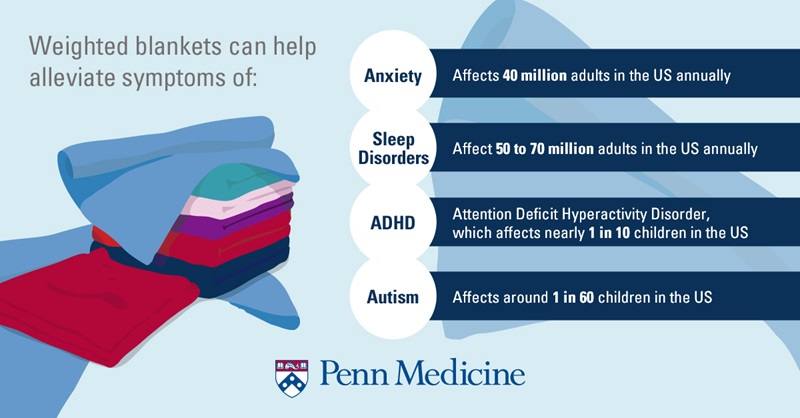Wrapping yourself up in a blanket can feel like one giant hug — with the right blanket, that is. If it’s soft, warm, and cozy, that’s a good start. But have you ever thought about how the weight of your blanket affects how comfortable it is? A heavy, weighted blanket can actually be more comforting and even beneficial to your health than its lighter counterpart.
Weighted blankets vary in size, shape, color, and material, depending on what you prefer. They’re usually filled with tiny plastic pellets to make them heavier. Some blankets have just a few extra pounds on them, which are ideal for small children. Others may have 20 or more pounds added, which are better suited for adults.
How Do Weighted Blankets Work?
When you’re stressed, your heart beats too quickly. When this happens, it's important to look to stress relief and mindfulness techniques such as deep breathing, meditation to bring down your heart rate. The gentle pressure on your body provided by a weighted blanket can also help to calm you by activating your parasympathetic nervous system, which lowers your heart rate when you’re stressed.
A weighted blanket uses “pressure therapy”, a calm-inducing amount of pressure on your entire body, similar to the feeling of being hugged, swaddled, stroked, or held. The right size and weight of a weighted blanket depend on the person’s needs.
Here are four conditions that weighted blankets can help children and adults with.
What Conditions Can a Weighted Blanket Help With?
Anxiety
Everyone experiences at some point. It’s that feeling of uneasiness and worry, usually about something in the future. It can cause your heart rate to increase and your breathing to get faster, which is a result of your body preparing for stress.
If anxiety is constant, and it’s disrupting your daily life, you may have an anxiety disorder. Instead of worrying about an upcoming event, you may worry excessively about everyday situations. This can make your body feel like it’s in a stressful situation or environment most or all of the time.
Based on what’s going on around you, your autonomic nervous system — which controls basic bodily functions such as breathing, digestion, sweating, and shivering — prepares your body for stress or rest. This is often called the fight or flight response.
The pressure of weighted blankets puts your autonomic nervous system into “rest” mode, reducing some of the symptoms of anxiety, such as a quickened heart rate or breathing. This can provide an overall sense of calm.
Sleep Disorders
If you find yourself tossing and turning in bed every once in a while, you’re not alone. Some 20 million Americans have trouble falling asleep occasionally — and over 40 million people in the US have long-term, chronic sleep disorders.
Attention Deficit Hyperactivity Disorder (ADHD)
“Children with attention deficit hyperactivity disorder (ADHD) have a harder time with self-control, especially when it comes to paying attention and sitting still. This can cause problems at school or at home, and it can impact their learning, as well as their relationships with friends and family,” said Dr. Levinson.
Children with ADHD are often distracted by what’s going on around them, such as other people talking or what’s happening outside. It’s harder for them to focus on what they want to focus on, like the teacher talking.
By activating the sense of touch, the weighted blankets keep children from becoming distracted by other sensory stimuli, such as sounds, coming from their surroundings. This can help them improve their attention, remain on task, stay in their seats, and fidget less. If your child does not want to use a blanket in class, you can get them a weighted vest, which works similarly to blankets.
Autism
Dr. Levinson explained that “when someone has Autism Spectrum Disorder (ASD), social interaction can be hard for them. This can lead to anxiety and stress, as well as make it harder to function in school, the workplace, and in public situations.”
The pressure from the weighted blankets can relieve stress for people with ASD and improve their ability to focus on the task at hand. It can also make them feel as if they’re being rewarded.
Individuals with ASD may also feel like sensory stimulations around them, such as noises and touch, are too intense. This can make activities like playing, working, and socializing more challenging. The pressure from a weighted blanket can actually help provide comfort from feeling over-stimulated and allow them to relax.
Source: pennmedicine.org


